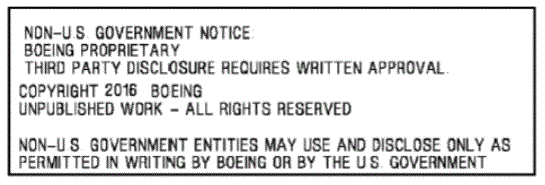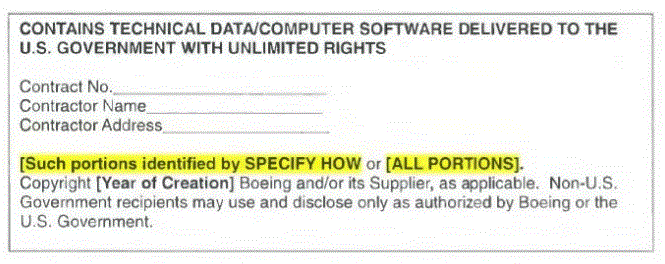The Boeing Company v. Air Force (Fed. Cir. 2020)
This is a government contract case involving rights to technical data provided to the government from a contractor. Boeing is working on a multi-billion-dollar F-15 Eagle Passive/Active Warning Survivability System (EPAWSS) project subject to a DoD contract. Under the contract, Boeing “retains ownership” of the technical data it generates and delivers. However, the U.S. Gov’t receives also “unlimited rights” to the data, including the right to “use, modify, reproduce, perform, display, release, or disclose [the] technical data in whole or in part, in any manner, and for any purpose whatsoever, and to have or authorize others to do so.”
When Boeing began providing data, it included first notice below. The U.S. Gov’t. objected to that language and Boeing offered the second alternative. Still though the U.S. Gov’t. objected as out of compliance with the DoD regulations. (DFARS 252.227-7013(f)). This objection apparently came as something of a surprise — Boeing says that it has been marking its technical data with propriety legends since 2002.
Boeing wanted to retain its limitations on use and further disclosure by “Non-U.S. Government recipients” and so petitioned to the Armed Services Board of Contract Appeals (ASBCA). After losing, Boeing brought its appeal to the Federal Circuit. On appeal here, though the Federal Circuit has reversed.
This is a contract dispute that focuses on the DoD regulations because they were incorporated into the contract. The regulations strictly limit they ways that a Contractor can “assert restrictions on the [US] Government’s right[s].” Here, the Federal Circuit drew a fine-point — finding that Boeing’s restrictions are expressly designed to restrict only non-US-Governmental parties. Although the regulations state that “All other markings are nonconforming markings,” the court held that that statement as only applying to markings that restrict US governmental rights.
Thus, we agree with Boeing that Subsection 7013(f) … is silent on any legends that a contractor may mark on its data when it seeks to restrict only the rights of non-government third parties.
Slip Op.
Anyone savvy will note that if the US government has “unlimited rights,” then those rights would include the full right to release, disclose, our otherwise authorize a third-party to use the data. Boeing’s modified proposal takes this into account — stating that third-parties use must be authorized either by Boeing or the U.S. Gov’t. However, the Gov’t still argues that its rights are being restricted because it requires the Government to be the “authorizer” — something potentially quite burdensome and “inconsistent with its unlimited rights.” On remand, the Board may consider this issue.
In its decision, the Federal Circuit walks through a set of light policy arguments as well:
Boeing asserts that the Board’s interpretation of Subsection 7013(f) will have far-reaching consequences that will impair contractors’ abilities to protect their rights in their technical data and threaten the willingness of technology innovators to do business with the government. The government responds that allowing contractors unbridled freedom to mark technical data with self-created legends of their choosing is inconsistent with the DFARS and would encumber unrestricted information with unclear markings that make it difficult for the government to exercise its license rights.
To be clear, neither party presents any policy arguments that would be sufficient to overcome the plain language of Subsection 7013(f), as explained above. In any event, we decide this case on the regulation, not policy. … But our interpretation of the plain language of Subsection 7013(f) has the added benefit of alleviating some of Boeing’s policy concerns.
Id.
Technical Data Rights: The underlying question, of course, is what rights are we talking about? The US does not have a category of property rights known as “technical data rights.” The best data protection may be trade-secret rights, but that does not seem to work here because we’re talking about data that has been turned over to another party without any restriction. Boeing’s copyright notice is probably the best-clue. However, copyright protection in a document is a far-cry being the “owner” of the technical data as the court discussed.



Side note: I was an officer in and commander of aircraft maintenance squadrons, including for Boeing aircraft, and I’m waaaaaaaaaay more familiar with the whole “technical order” morass than I really want to be.
The real problem here is that Boeing doesn’t want its maintenance manuals made unprofitable for export models of the same airframes. Absent a marker “reserving” to Boeing that right, it fears that its maintenance manuals will be copied by foreign technicians brought over to the US for training — an exceedingly common occurrence even three-plus decades ago. The aircraft manufacturer (and/or its “aftermarket” allies) usually makes at least half the profit on the whole deal from post-sale maintenance and support — and especially for aircraft going to non-NATO countries (like the F-15 series at issue here), those expensive manuals are a major profit center in and of themselves.
So the context of this dispute is a little bit more complex and a lot less value-neutral than it seems…
Thanks for this extra background, it’s very helpful!
+1
+1
Appreciate the insights. Still remember another DoD contract bid situation where the legends were stripped off the original bidder’s documents and the DoD gave the ‘cleaned’ document to a competing bidder who was thereafter awarded the contract. The DoD response back then was nothing more than T.S. Court closed its eyes. There was no competitive bidding when additional contracts were up for bid. Result? Sole sourced. Cost higher than one would have expected.
For what it’s worth, “technical data rights” are a set of rights akin to trade secret set forth primarily in FAR (Federal Acquisition Regulation) 52.227-14 and DFARS (Defense FAR Supplement) 252.227-7013 and -7014. The FAR defines technical data as follows: “Technical data means recorded information (regardless of the form or method of the recording) of a scientific or technical nature (including computer databases and computer software documentation). This term does not include computer software or financial, administrative, cost or pricing, or management data or other information incidental to contract administration. The term includes recorded information of a scientific or technical nature that is included in computer databases.” The DFARS has a similar definition. The FAR and DFARS then define various rights in data the US Government may obtain including limited rights (similar level to granted under an NDA to technical data), restricted rights (similar level granted under an NDA, but for software only), unlimited rights (no restrictions), government purpose rights (use only for a US Government purpose, with no commercial rights; only in DFARS), and specifically-negotiated rights (rights anywhere between limited and unlimited, as negotiated by the contractor/Government). The rights a contractor can claim in technical data are determined based on the funding used to develop the data, or the underlying item, component, or process depicted in the data.
It’s interesting from a patent is a “contract” view, sorry “franchise.” What if the government/patent office took the position, or a law was created, that gave the government the right to say, “its obvious and we don’t want to give you this contract/franchise” no matter what a higher court thinks about obviousness/patentable subject matter – we don’t have to because we don’t have to enter into contracts/franchises if we don’t want too.
Does the contracted item need to have some ‘deeper’ meaning that you appear to be searching for?
Anon – I’m not sure what you are referring to.
I do think that you’ll agree that the generalized “ownership” claim over “technical data” lacks clarity.
Is it a lack of clarity? Or something else?
‘My data’ does not lack clarity.
“I own my data” does not lack clarity.
If you seek to imbue “ownership” with the traditional Intellectual Property garbs of ownership, then you seek a level of clarity that may not adhere to the contracted item.
One has freedom to contract over most anything. “Technical results” of very specific product development efforts certainly does not lack clarity.
(that’s the ‘my data’ aspect).
The “I own mine” aspect is simply not applying the IP spin that you may be accustomed to. That does not make it ‘unclear’ (unless you are trying to FIT that aspect into the IP spin).
It is ‘unclear’ how one would (force)fit the colloquial into the pre-ordained categories, but this would be an error of (your) effort, rather than any inherent error in the attempt to contract.
Comments are closed.